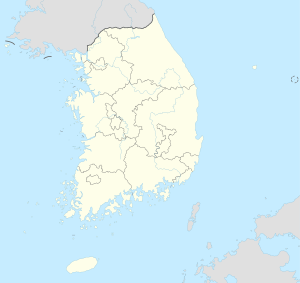Jeonju
| Jeonju-si | |||
|---|---|---|---|
| Korean alphabet : | 전주시 | ||
| Chinese characters : | 全 州市 | ||
| Revised Romanization : | Jeonju-si | ||
| McCune-Reischauer : | Chonju-shi | ||
| Basic data | |||
| Province : | Jeollabuk-do | ||
| Coordinates : | 35 ° 49 ' N , 127 ° 9' E | ||
| Surface: | 206.25 km² | ||
| Residents: | 622.180 (status: 2004) | ||
| Population density : | 3,017 inhabitants per km² | ||
| Structure: | 2 districts ( gu ), 40 neighborhoods ( dong ) |
||
| Postal code : | 560-011-561-870 | ||
| map | |||
|
|||
Jeonju ( Jeonju-si , IPA : Tɕʌndʑu) is the capital of Jeollabuk-do Province in South Korea . It is located about 230 km south of Seoul and is a tourist center, which is known for its food, historical buildings, sporting events and some festivals. During the 2002 World Cup , three games took place in Jeonju.
history
Jeonju has a long history. In the Kingdom of Baekje it was already a center of the region under the name of Wansan . During the Unified Silla Period in 892 , military leader Gyeon Hwon rebelled against the increasingly ineffective Silla Dynasty and established the Late Baekje Kingdom . Before he could gain control of the entire Korean Peninsula , however, his troops were defeated by Goryeo's army . Jeonju is also the hometown of the Jeonju-Yi family who founded the Joseon Dynasty .
In 1935 the city got the status of a big city and in 1945 it was declared a city ( si ).
economy
Jeonju is also the economic center of Jeollabuk-do Province. Among other things, the largest paper manufacturer in South Korea is based here.
education
There are several universities in Jeonju:
- Chonbuk National University
- Jeonju National University of Education
- Jeonju University
- Woosuk University
Culture
Jeonju was already known beyond the borders of Korea for his paper at the time of the Three Kingdoms . Even today you can still buy handmade paper, writing brushes and paper fans here. Jeonju is also known nationwide for its food, particularly bibimbap and gongnamul gukbap . The composition differs from restaurant to restaurant, but basically bibimbap consists of half a dozen types of seasoned vegetables, marinated strips of meat, a fried egg and a red pepper paste, and, in Korea almost inevitable, boiled rice. The whole thing is then served in a hot stone vessel. Gongnamul Gukbap is a spicy soup that mainly consists of rice and mung bean sprouts.
A large number of historical buildings can be admired in Jeonju. The best known is probably Pungnam-mun , the south gate of the city fortress. Originally built in 1389 , it can now be seen in the modified form from 1768 .
The Hanok Village ( Hanok Maeul ) is the largest contiguous traditional residential area in Korea with over 800 preserved traditional Korean houses ( Hanok ). Many of the courtyard houses house museums, studios, restaurants, teahouses, souvenir shops and boutiques. In one of the hanok there is also the Traditional Liquor Museum , which offers an insight into the traditional production of soju .
gallery
Jeonju City Center (Wansan District) during the Japanese rule of Korea
structure
Jeonju is divided into two districts ( gu ):
- Wansan-gu ( 완산구 )
- Deokjin-gu ( 덕진구 )
Twin cities
- San Diego , California , USA since May 20, 1983
- Suzhou , People's Republic of China since March 21, 1996
- Kanazawa , Japan since April 30, 2002
sons and daughters of the town
- Sejong (1397–1450), fourth king of the Joseon dynasty
- Vincent Ri Pyung-ho (* 1941), Roman Catholic clergyman, bishop emeritus of Jeonju
- Han Duck-soo (* 1949), South Korean Prime Minister (2007-09)
- Kim Kwan-jin (* 1949), retired politician and general
- Jang Joon-hwan (* 1970), film director and screenwriter
- Choi Dong-hun (* 1971), film director, screenwriter and actor
- Ken Ryker (* 1972), American porn actor
- Ha Tae-kwon (* 1975), badminton player
- Jung Jae-sung (1982-2018), badminton player
- Taeyeon (* 1989), singer and band leader of Girls' Generation
- Kim Ho-yeong (* 1990), soccer player
- Kim Young-gwon (born 1990), soccer player
- Lee Jeong-il (* 1990), natural toboggan runner
- Kim Jin-su (* 1992), soccer player
- Kim A-lang (* 1995), short tracker











